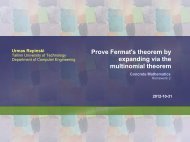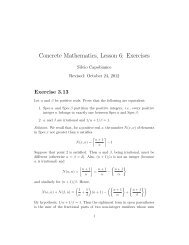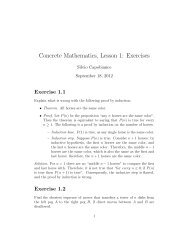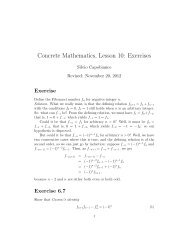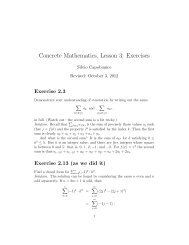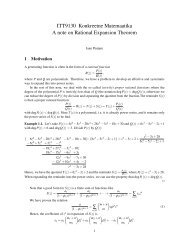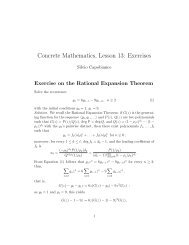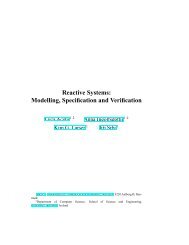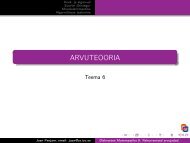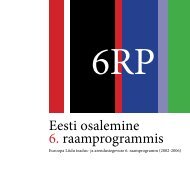Visiting Researcher's Guide - EURAXESS Estonia
Visiting Researcher's Guide - EURAXESS Estonia
Visiting Researcher's Guide - EURAXESS Estonia
You also want an ePaper? Increase the reach of your titles
YUMPU automatically turns print PDFs into web optimized ePapers that Google loves.
40<br />
General working time in <strong>Estonia</strong> is 8 hours a<br />
day, 5 days per week. 12 public holidays and<br />
one national holiday, i.e. the Anniversary of<br />
the Republic of <strong>Estonia</strong> on the 24th of February,<br />
are days off.<br />
The duration of the annual vacation is 28<br />
days, and an extended vacation is granted<br />
in the case of some professions, such as<br />
state officials and local government officials,<br />
teachers, academic staff and other pedagogical<br />
and scientific staff, and others. National<br />
holidays and public holidays are not<br />
included in the calculations of the duration<br />
of the vacation. Employees who have worked<br />
at least six months during their first working<br />
year have the right to be granted a vacation<br />
in proportion to the number of months<br />
worked.<br />
A woman is granted 140 days pregnancy and<br />
maternity leave, which may be commenced<br />
70 days before the estimated birth of the<br />
child. The pregnancy and maternity leave<br />
should be commenced at least 30 days before<br />
the estimated birth of the child, or else<br />
deductions will be made to the maternity<br />
benefit. A mother or father shall be granted<br />
parental leave at her or his request for raising<br />
a child of up to 3 years of age. For more<br />
details about maternity and child-care benefits,<br />
see chapter 6.2 Family benefits.<br />
WORK<br />
4.3 General working conditions and regulations<br />
Employment contracts may have a specified<br />
or an unspecified term. In the event<br />
that the term is fixed, the contract is made<br />
for no longer than 5 years. With the agreement<br />
of both employer and employee, an<br />
employment contract can be terminated at<br />
any time. It can be terminated on the initiative<br />
of the employee by giving at least one<br />
month notice in advance if the employment<br />
agreement has an unspecified term. In the<br />
case of an employment contract with a fixed<br />
term, it is necessary to give 2 weeks advance<br />
notice, if the term of the contract exceeds<br />
one year, and 5 days in the event of a shorter<br />
contract.<br />
Employment contracts may only be terminated<br />
on the initiative of the employer for<br />
serious reasons and with at least two weeks<br />
advance notice (in the case of long-term incapacity<br />
for work), although in most cases<br />
notice must be given at least 1 month in advance.<br />
It is generally prohibited to terminate an employment<br />
contract with a pregnant woman<br />
or a person raising a child under three years<br />
of age. An employment contract with a pregnant<br />
woman or the parent of a child under<br />
three years of age can be terminated only<br />
with the consent of the labour inspector.




